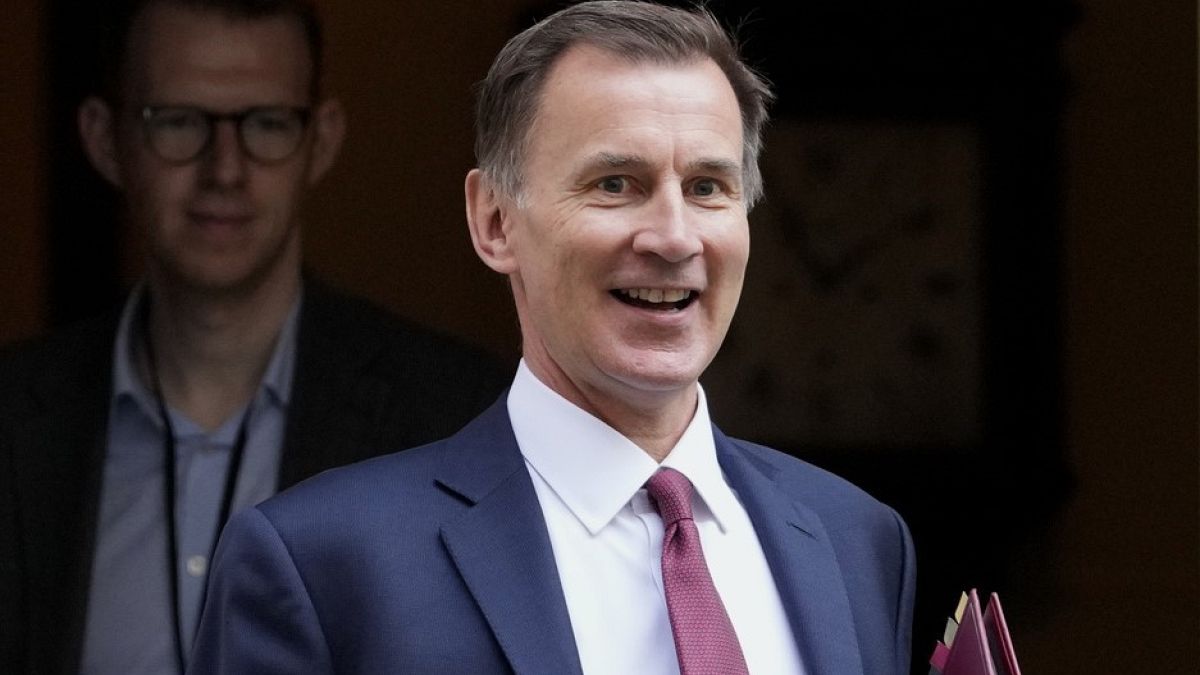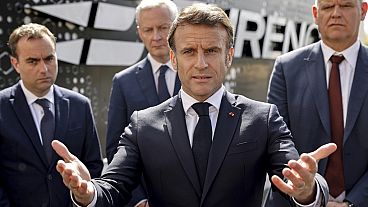UK Chancellor Jeremy Hunt is set to outline the government’s financial plan for the year ahead. What can we expect? Euronews Business takes a look.
In the wake of the pandemic and a spike in worldwide energy prices, the UK economy isn’t in the best shape.
Interest rates have been raised 14 times since 2021, a measure designed to control inflation, but one that has squeezed the wallets of consumers and investors.
The Bank of England is predicting zero growth for the UK until 2025 and it’s likely that interest rates will remain high for the foreseeable future.
Added to this, public debt now stands close to 100% of economic output, a figure three times larger than it was 20 years ago.
Given these sticky circumstances, does the chancellor have much room for manoeuvre?
Potential tax cuts
Tax levels in the UK are currently at their highest since records began 70 years ago, according to the Institute for Fiscal Studies (IFS), but many expect the Autumn Statement to marginally relieve this burden.
In a speech on Monday, Prime Minister Rishi Sunak warned against “doing anything that puts at risk our progress in controlling inflation”, but hinted at his support for responsible tax breaks.
In January, the government pledged to halve inflation by the end of 2023.
With the Consumer Price Index inflation coming in at 4.6% in October, this target has been met, although it’s important to note that much of the heavy lifting was done by the Bank of England.
The drop in inflation means that prices are continuing to rise, but that they are rising at a slower rate.
Inflation is still above the 2% target set by the Bank of England, yet in light of these somewhat positive figures, the PM has said that it’s time to “turn our attention to cutting tax”.
One of the levies that could be slashed is inheritance tax, the money you pay on assets gifted to you by someone who has died.
At the moment, UK citizens pay a 40% fee when the inheritance surpasses the tax-free threshold of £325,000 (€372,000), although Hunt could go as far as halving this rate.
Some Conservative MPs are calling for the levy to be scrapped altogether, which would cost almost £15 billion a year in lost revenue by 2032, according to the IFS.
Getting rid of inheritance tax is however an unpopular idea in certain circles.
Some commentators fear the repercussions the move could have for shares on the Alternative Investment Market (AIM), a sub-market of the London Stock Exchange.
Many AIM shares are free from inheritance tax if held for more than two years, meaning that abolishing the tax could diminish the demand for shares.
Not only that, critics of the potential abolition of inheritance tax argue this would reduce the government's budget for spending on public and social services.
They argue that slashing the tax will only benefit a small, wealthy minority of the population.
Fewer than one in 20 estates currently pay inheritance tax, according to the BBC. In other terms, just under 4% of deaths result in the payment of the tax, working out at around 27,000 estates per year.
Aside from a potential reduction in inheritance tax, the i newspaper says the government could also cut stamp duty, money you pay to the state when you buy property.
This prediction is reiterated by The Telegraph, which reports that new homeowners could receive a partial rebate on stamp duty if they make their properties more energy efficient.
Further possible tax reductions could equally come in the form of lower income taxes or national insurance contributions, which are fees paid by all employees and employers.
Crackdown on benefit fraudsters
The potential cut in inheritance tax could be politically awkward in light of a planned reduction in welfare benefits - feeding into criticism that the Conservative Party works solely for the interests of the rich.
In his speech yesterday, PM Rishi Sunak said that the UK’s benefits system should be “compassionate” but pledged to “clamp down on welfare fraudsters”.
“We believe in the inherent dignity of a good job. And we believe that work, not welfare, is the best route out of poverty,” he added.
Under the Back to Work Plan, which was announced last week but is part of the Autumn Statement, the government is aiming to get more unemployed people back into work.
In the three months to July, 300,000 people in the UK had been registered as unemployed for more than a year, and more than 8.7 million working-age adults were neither in work nor looking for a job.
In an attempt to combat this, the government has earmarked £2.5 billion for career support over the next five years, and it hopes to crack down on those abusing the welfare system.
Benefit claimants will be obliged to undertake work experience placements if they haven’t been able to find a job within a period of 18 months, and if they fail to attend, they will lose their benefits.
Changes to pensions
Many are also wondering what Jeremy Hunt’s statement will mean for pensions.
Under a policy known as the ‘triple lock’, state pensions are supposed to increase each April in line with the highest of one of three things: either the inflation rate, average earnings, or 2.5%.
This year, earnings growth is the highest of these three categories, at 8.5%.
Therefore, following the triple lock approach, someone on the full new state pension should see their pension rise from £203.85 to £221.20 per week, whilst someone who reached the state pension threshold before 2016 should see their basic allowance go from £156.20 to £169.50 per week.
Despite this, some fear an adjustment to the triple lock, as the 8.5% figure has been inflated by the effect of bonuses given to NHS workers and civil servants.
As an alternative approach, the government could decide to use the CPI inflation figure (6.7%), or it may calculate the earnings growth without factoring in the bonuses.
Yahoo! Finance estimates this adjusted earnings figure at 7.8%.
Mortgage help for first-time buyers
Jeremy Hunt is also expected to give more help to those trying to get on the housing ladder.
He may do this by expanding a mortgage guarantee scheme first introduced in March 2021 by then Chancellor Rishi Sunak.
Initially intended to last until December 2022, the scheme was given a year-long extension last winter, and Jeremy Hunt may once again decide to push back this end date.
The policy allows people to take out a mortgage with a 5% deposit at a time when rocketing inflation is pushing up borrowing costs.
Wednesday’s statement could also include proposed changes to tax-free ISAs (Individual Savings Accounts), which could help buyers to save for a first home.
One proposal is that some ISAs could even allow you to hold both stocks and cash in a single account.
Upcoming election giveaways
The Conservative Party is on course to call an election next year and this will undoubtedly be factored into the planning for the Autumn Statement.
After 13 years in power and a string of political gaffes, the party is flailing in the polls, but Jeremy Hunt will still be trying to woo voters by presenting himself as the fiscally responsible candidate.
Speaking yesterday, Rishi Sunak warned that if the opposition Labour Party took the reins, they would adopt a catastrophic “big government, big spending approach”.
“This makes the same economic mistake as last year’s mini-budget,” Sunak said. “Blowing tens of billions of pounds on unfunded spending is just as dangerous as blowing tens of billions of pounds on unfunded tax cuts.”
In light of these statements, many analysts believe tomorrow’s budget will convey an overall cautious approach, even if some tax relief may be granted to voters.
The government may also wait until spring to announce more dramatic giveaways, when the public will likely be closer to heading to the polls.



